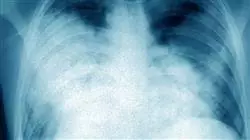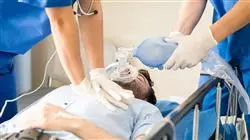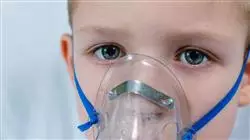University certificate
The world's largest faculty of nursing”
Why study at TECH?
This training will generate a sense of confidence in the performance of healthcare praxis, which will help you grow personally and professionally"

New infectious diseases are emerging all the time, joining those already known and for which new treatments must be found to cure them. Sometimes, the symptoms of these diseases are so severe and unknown that patients go directly to the Emergency Department, where nurses must deal with cases of great relevance and for which they need a higher training.
For this reason, TECH has proposed this specialization of the highest academic level, specifically for nurses, which deals with respiratory and cardiovascular pathologies. Thus, a program has been developed that includes the classic aspects in the management of infectious pathology by apparatus or organs, but also new items that are essential for the correct management of infectious diseases in the current scenario of globalization of health.
Thus, we will deal with the management of infectious diseases in Emergency Departments from the point of view of early diagnosis and treatment, often empirical, but we will also include an update on imported pathology, especially in those entities that require urgent action and/or present a potential transmission capacity in our environment.
Likewise, we will dedicate an important part of our educational program to the concept of risk prevention, derived from the care of infectious diseases, both for health personnel and the population, delving into the measures that can be adopted in the Emergency Department to minimize them.
On the other hand, being a 100% online training, the professional will have the ability to decide when and from where to study, without commitments or obligations, thus being able to combine their study time with the rest of their daily obligations.
Increase your training in the treatment of people with Respiratory and Cardiovascular Infections in a comfortable way and with all the guarantees of obtaining a quality and up-to-date specialization"
This Postgraduate diploma in Respiratory and Cardiovascular Infections in the Emergency Department for Nursing contains the most complete and up-to-date scientific program on the market. The most important features include:
- The development of clinical cases presented by experts in Respiratory and Cardiovascular Infections
- The graphic, schematic, and eminently practical contents with which they are created provide scientific and practical information on the disciplines that are essential for professional
- Therapeutic developments on the intervention in Respiratory and Cardiovascular Infections
- Practical exercises where to carry out the self-assessment process to improve learning
- An algorithm-based interactive learning system for decision-making in the clinical situations presented throughout the course
- Its special emphasis on research methodologies
- Theoretical lessons, questions to the expert, debate forums on controversial topics, and individual reflection assignments
- Content that is accessible from any fixed or portable device with an Internet connection
With this high-level program, you will be able to identify the main human pathogens in our environment”
Its teaching staff includes professionals from the nursing field, who contribute their work experience to this training, as well as renowned specialists from leading scientific societies.
The multimedia content, developed with the latest educational technology, will provide the professional with situated and contextual learning, i.e., a simulated environment that will provide an immersive training experience designed to train for real-life situations.
The design of this program focuses on Problem-Based Learning, by means of which the nurse must try to solve the different professional practice situations that arise throughout the academic year. To this end, the professional will be assisted by an innovative interactive video system developed by recognized experts in the field of Respiratory and Cardiovascular Infections in the Emergency Department for Nursing and with extensive teaching experience.
Increase your decision-making confidence by updating your knowledge with this University Expert course”

Take the opportunity to learn about the latest advances in Respiratory and Cardiovascular Infections in the Emergency Department for Nursing and improve the care of your patients”
Syllabus
The structure of the contents has been designed by a team of professionals from the best hospitals and universities, aware of the relevance of this specialization in order to intervene in the treatment and monitoring of Respiratory and Cardiovascular Infections in the Emergency Department for Nursing and committed to quality teaching through new educational technologies.

This Postgraduate diploma contains the most complete and up-to-date scientific program on the market"
Module 1. Update on Infectious Diseases
1.1. Principles of Infection
1.1.1. Virulence Factors and Toxins
1.1.2. Defensive Mechanisms of the Host
1.2. Main Human Pathogens in our Environment
1.2.1. Current Epidemiology of the Infection
1.2.2. Data on a Worldwide Level
1.2.3. Data in our Environment
1.2.4. Microbial Resistance
1.3. Current Scenarios of Infection in the Emergency Department
1.3.1. Elderly Patients
1.3.2. Oncology Patients
1.3.3. Chronic Renal Patients on Dialysis
1.3.4. Transplant Recipient
1.3.5. HIV Infection
1.3.6. Travelers and Immigrants
1.4. Etiopathogenic Profiles of Infection
1.4.1. Bacterial Infections
1.4.2. Viral Infections
1.4.3. Fungal Infections
1.4.4. Microbacterial Infections
1.4.5. Parasitic Infections
Module 2. The Microbiology Laboratory in the Emergency Department
2.1. Process of Sample Collection
2.1.1. General Considerations for Taking, Conserving and Transporting the Samples for Microbiological Study
2.1.2. Material for Sample Collection
2.2. Management of Samples in the Laboratory
2.2.1. Receiving Samples
2.2.2. Processing
2.2.3. Methods and Techniques used for Microbiological Diagnosis According to the Main Infectious Syndromes
2.3. Techniques Available for Emergency Diagnoses
2.3.1. Bacteria
2.3.2. Virus
2.3.3. Fungi
2.3.4. Mycobacteria
2.3.5. Parasites
2.4. Interpretation of Preliminary Results
2.4.1. Interpretation of Microbiological Diagnostic Tests
2.5. Procedures in Hospitals Without On-call Microbiologists
2.5.1. Disadvantages of Not Having an On-call Microbiologist
2.5.2. Advantages of Having an On-call Microbiologist
2.5.3. On-call Care without a Microbiologist
Module 3. Infections of Organs and Apparatus (III): Inferior Airway, Intra-abdominal
3.1. Acute Bronchitis
3.1.1. Definition
3.1.2. Clinical Manifestations
3.1.3. Diagnosis
3.1.4. Treatment
3.2. Acute Chronic Obstructive Pulmonary Disease (ACOPD)
3.2.1. Definition
3.2.2. Diagnosis
3.2.3. Treatment
3.2.4. Attitude to Clinical Failure
3.2.5. Key Concepts
3.3. Community-Acquired Pneumonia (CAP)
3.3.1. Concept
3.3.2. Pathophysiology
3.3.3. Epidemiology
3.3.4. Etiology
3.3.5.Clinical manifestations
3.3.6. Diagnostic Attitude
3.3.7. Antibiotic Treatment
3.4. Healthcare-Associated Pneumonia (HAP)
3.4.1. Concept
3.4.2. Healthcare-Associated Pneumonia Versus Community-Acquired Pneumonia due to Resistant Pathogens (CAP-PR)
3.4.3. Etiology
3.4.4. Microbiological Diagnosis
3.4.5. Empirical Treatment
3.4.6. Prognosis
3.5. Pneumonic Pleural Effusion and Empyema
3.5.1. Clinical Symptoms
3.5.2. Staging
3.5.3. Imaging Tests
3.5.4. Laboratory Studies: Pleural Fluid Analysis
3.5.5. Pathophysiology Staging
3.5.6. Bacteriology
3.5.7. Prognosis
3.5.8. Treatment
3.6. Pulmonary Abscess
3.6.1. Definition
3.6.2. Etiology
3.6.3. Pathophysiology
3.6.4. Clinical Manifestations
3.6.5. Diagnosis
3.6.6. Treatment
3.7. ulmonary Tuberculosis
3.7.1. Etiology
3.7.2. Clinical Manifestations
3.7.3. Diagnosis
3.7.4. Treatment
3.8. Gastroenteritis
3.8.1. Etiology
3.8.2. Clinical Manifestations and Physical Examination
3.8.3. Laboratory Data and Imaging Tests
3.8.4. Diagnosis
3.8.5. Treatment
3.9. Liver and Biliary Tract Infections
3.9.1. Bacterial Infections which Affect the Liver
3.9.2. Viral Infections which Affect the Liver
3.9.3. Parasitic Infections which Affect the Liver
3.9.4. Fungal Infections which Affect the Liver
3.10. Cholecystitis and Cholangitis
3.10.1. Acute Cholecystitis
3.10.2. Acute Cholangitis
3.11. Liver Abscesses
3.11.1. Concept and General Characteristics
3.11.2. Classification and Etiopathogenesis
3.11.3. Pyogenic Hepatic Abscesses
3.11.4. Amoebic Liver Abscesses
3.12. Acute Hepatitis
3.12.1. Definition
3.12.2. Etiology
3.12.3. Clinical Manifestations and Physical Examination
3.12.4. Laboratory Data
3.12.5. Diagnosis
3.12.6. Severe Acute Hepatitis
3.12.7. Severe Acute Liver Failure
3.12.8. Treatment
3.13. Pancreatitis
3.13.1. Etiology
3.13.2. Diagnosis
3.13.3. Classification
3.13.4. Severity Prediciton and Prognostic
3.13.5. Treatment
3.13.6. Infectious Complications
3.14. Appendicitis
3.14.1. Epidemiology
3.14.2. Aetiopathogenesis
3.14.3. Microbiology
3.14.4. Diagnosis
3.14.5. Differential Diagnosis
3.14.6. Treatment
3.14.7. Preoperative Antibiotic Prophylaxis
3.14.8. Postoperative Antibiotic Treatment
3.14.9. Post-surgery Complications
3.15. Diverticulitis and Perirectal Abscess
3.15.1. Definition of Diverticulitis
3.15.2. Pathogenesis
3.15.3. Risk Factors
3.15.4. Diverticulitis Diagnosis
3.15.5. Diverticulitis Classification
3.15.6. Treatment for Diverticulitis
3.15.7.Perirectal Abscess
3.16. Typhlitis
3.16.1. Epidemiology
3.16.2. Etiology
3.16.3. Pathogenesis
3.16.4. Clinical Manifestations
3.16.5. Diagnosis
3.16.6. Differential Diagnosis
3.16.7. Treatment
3.17. Peritonitis
3.17.1. Classification
3.17.2. Pathogenesis
3.17.3. Diagnosis
3.17.4. Assess the Severity of the Infection
3.17.5. Treatment
3.18. Spontaneous Bacterial Peritonitis
3.18.1. Concept
3.18.2. Epidemiology
3.18.3. Pathogenesis
3.18.4. Clinical Manifestations
3.18.5. Diagnosis
3.18.6. Prognosis
3.18.7. Treatment
3.18.8. Prophylaxis
3.19. Secondary Peritonitis
3.19.1. Definition and Classification
3.19.2. Microbiology
3.19.3. Evaluation of Severity
3.19.4. General Principles for the Management
3.20. Intraperitoneal Abscess
3.20.1. Definition
3.20.2. Epidemiology
3.20.3. Etiology and Pathophysiology
3.20.4. Diagnosis
3.20.5. Treatment
Module 4. Infections of Organs and Apparatus (IV): Cardiovascular, CNS
4.1. Infectious Endocarditis
4.1.1. Epidemiology
4.1.2. Etiology
4.1.3. Clinical Symptoms
4.1.4. Diagnosis
4.1.5. Treatment
4.1.6. Prevention
4.2. Infection of Intravascular Devices
4.2.1. Infections Associated with Intravascular Catheter
4.2.2. Infections Related to Implantable Electronic Cardiovascular Implantable Cardiovascular Devices
4.3. Acute Pericarditis
4.3.1. Definition
4.3.2. Incessant and Chronic Pericarditis
4.3.3 Recurrent Pericarditis
4.3.4. Myopericarditis
4.4. Mediastinitis
4.4.1. Acute Mediastinitis
4.4.2. Sclerosing Mediastinitis
4.5. Meningitis
4.5.1. Epidemiology and Etiopathogenesis
4.5.2. Diagnosis of Meningitis: Clinical and Laboratory
4.5.3. Antimicrobial Treatment
4.6. Encephalitis
4.6.1. Epidemiology and Etiopathogenesis
4.6.2. Diagnosis of Encephalitis: Clinical and Complementary Evaluations
4.6.3. Antimicrobial Treatment
4.7. Myelitis
4.7.1. Epidemiology and Etiopathogenesis
4.7.2. Clinical symptoms
4.7.3. Diagnosis
4.7.4. Cerebral Abscess
4.8.1. Aetiopathogenesis
4.8.2. Clinical Manifestations and Diagnosis
4.8.3. Treatment
4.9. Subdural Empyema, Epidural Abscess and Intracranial Thrombophlebitis
4.9.1. Subdural Empyema: Etiopathogenesis, Clinical Manifestations, Diagnosis and Treatment
4.9.2. Epidural Abscess: Etiopathogenesis, Clinical Manifestations, Diagnosis and Treatment
4.9.3. Septic Thrombophlebitis: Etiopathogenesis, Clinical Manifestations, Diagnosis and Treatment
4.10. CSF Shunt Infections
4.10.1. Aetiopathogenesis
4.10.2. Clinical manifestations
4.10.3. Diagnosis
4.10.4. Treatment

Make the most of this opportunity to learn about the latest advances in this subject to apply it to your daily practice"
Postgraduate Diploma in Respiratory and Cardiovascular Infections in Emergencies for Nursing
The Postgraduate Diploma in Respiratory and Cardiovascular Emergency Infections for Nursing at TECH Global University is an academic program specifically designed to provide students with specialized knowledge about the care of patients with these conditions in the emergency setting. This study aims to train professionals for the care of patients with respiratory and cardiovascular diseases, providing a detailed understanding of the pathologies, diagnostic evaluation, interpretation of tests and the most appropriate treatments for each case. Students in this academic program will gain a solid foundation in the various techniques and procedures used to treat patients with respiratory and cardiovascular diseases, allowing them to develop skills and abilities in the proper management of these cases.
Study online from anywhere in the world
In TECH Global University we understand the multiple occupations of your day to day, that's why all our classes are taught remotely, so you can connect from anywhere. We are considered by Forbes as one of the best digital universities in the world which accredits us to provide the best experience to our students. If you want to complement your study experience you can access our multimedia pills, online library and complementary readings that the university has provided for you. The Nursing Respiratory and Cardiovascular Emergency Infections Postgraduate Diploma is an invaluable asset to hospitals, clinics, health care facilities and health care organizations looking for professionals trained to provide specialized care for patients with respiratory and cardiovascular disease. If you are interested in enhancing your professional preparation and gaining specialized knowledge in the care of patients with respiratory and cardiovascular disease in the emergency setting, then the Postgraduate Diploma in Emergency Respiratory and Cardiovascular Infections for Nursing is definitely the academic program for you. Enroll now!







